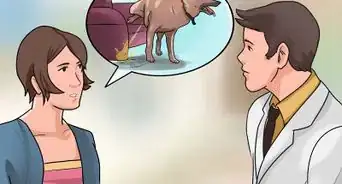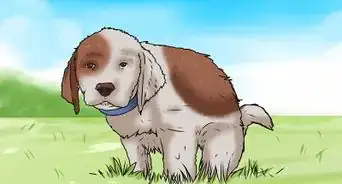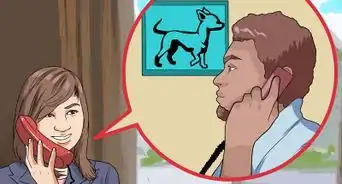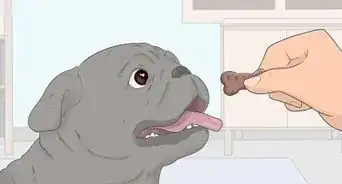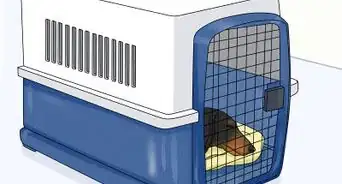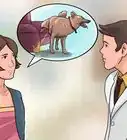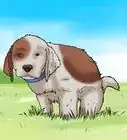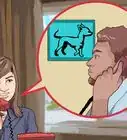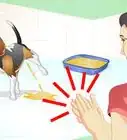This article was co-authored by Beverly Ulbrich. Beverly Ulbrich is a Dog Behaviorist and Trainer and the Founder of The Pooch Coach, a private dog training business based in the San Francisco Bay Area. She is a Certified CGC (Canine Good Citizen) Evaluator by the American Kennel Club and has served on the Board of Directors for the American Humane Association and Rocket Dog Rescue. She has been voted the best private dog trainer in the San Francisco Bay Area 4 times by SF Chronicle and by Bay Woof, and she has won 4 "Top Dog Blog" awards. She has also been featured on TV as a dog behavior expert. Beverly has over 18 years of dog behavior training experience and specializes in dog aggression and anxiety training. She has a Master of Business Administration from Santa Clara University and a BS from Rutgers University.
This article has been viewed 535,998 times.
You’ve let your dog outside to go to the bathroom. However, as soon as your dog comes back inside, it urinates again! This scenario can be very baffling and frustrating for dog owners. Dogs will urinate inside after going outside for a number of reasons, including health problems (diabetes, kidney disease) and inadequate housetraining.[1] Before becoming too frustrated, try different strategies to stop your dog’s inappropriate urination behavior.
Steps
Going Outside with Your Dog
-
1Maintain a consistent bathroom schedule. A consistent bathroom schedule is a key component of proper house training. It will teach your dog to urinate outside at certain times, such as after waking up, after a meal, and about 20 minutes before going to bed. This is especially important for puppies, since they have weak bladder muscles and are still learning where they should urinate.[2]
Bathroom routines are important for adult dogs as well. Be mindful that even an adult dog can urinate inside if it wasn’t properly house trained as a puppy.
-
2Designate a specific outdoor bathroom area. Having a specific outdoor bathroom spot will teach your dog to urinate outside, not inside. If you have a backyard, put your dog on a leash and take it to an area of the yard that’s protected from weather elements (rain, wind). Allow your dog to pick the exact bathroom spot within this area.[3]
- Give your dog praise when it urinates in this area, or just shows interest in it.
- This will not be as important if your dog already has a specific bathroom spot, or you do not have a backyard.
Advertisement -
3Do not play with your dog. Playing with your dog can distract it from urinating completely. This is common in puppies, since they can become easily distracted. When you take your dog out, let it do its business without you playing with it.[4]
- Consider just standing still until your dog finishes urinating.[5]
-
4Give your dog 10‒15 minutes to finish urinating. Unless your dog’s bladder is full, your dog may not urinate completely as soon as it gets outside. Your dog may need some time before its bladder muscles relax enough for urination. Also, if you have a puppy, it may need a few minutes to get focused on going to the bathroom.[6]
- Don’t be surprised if your dog urinates several times. It may need to make several ‘pit stops’ to urinate completely.[7]
-
5Reward your dog after it finishes urinating. Give your dog verbal praise, and maybe a treat, when it finishes urinating. This will reinforce the idea that urinating outside is the right thing to do. If you want to give your dog treats, keep them hidden until after it finishes urinating. If your dog sees the treats, it may get distracted from going to the bathroom.[8] [9]EXPERT TIPBeverly Ulbrich is a Dog Behaviorist and Trainer and the Founder of The Pooch Coach, a private dog training business based in the San Francisco Bay Area. She is a Certified CGC (Canine Good Citizen) Evaluator by the American Kennel Club and has served on the Board of Directors for the American Humane Association and Rocket Dog Rescue. She has been voted the best private dog trainer in the San Francisco Bay Area 4 times by SF Chronicle and by Bay Woof, and she has won 4 "Top Dog Blog" awards. She has also been featured on TV as a dog behavior expert. Beverly has over 18 years of dog behavior training experience and specializes in dog aggression and anxiety training. She has a Master of Business Administration from Santa Clara University and a BS from Rutgers University.Dog Behaviorist & Trainer

 Beverly Ulbrich
Beverly Ulbrich
Dog Behaviorist & TrainerOur Expert Agrees: Continue to reward your dog with treats until they have had no accidents for at least 2-3 weeks. This way, you will ensure that your dog will be 100% potty trained.
-
6Do not go inside immediately after your dog finishes urinating. If you’re in a rush, you may want to go back inside as soon as your dog finishes urinating. However, to your dog, this can signal the end of ‘fun time’ outside. It may not fully urinate to prolong the fun time, then urinate once it’s back inside. Rather than going right back inside, have extra outdoor playtime or continue the walk even after your dog’s finished urinating.
- If the weather is bad, don’t feel obligated to spend extra time outside. Your dog will probably want to go back inside as much as you do.
Responding to Indoor Accidents
-
1Do not rub your dog’s face in the urine. It may take a while for your dog to stop urinating inside after going outside. If you continue to see urine puddles in your home, do not punish your dog by rubbing its face in the urine. Not only is that form of discipline ineffective, but it will make your dog fearful of you.
- Your dog may think the problem is urinating in front of you, not urinating inside. Therefore, it may find secret places to urinate.[10]
-
2Discipline your dog in the moment. Do not discipline your dog for urinating inside if you didn’t catch it in the act. If you try to discipline after the fact, your dog will not know what it’s being punished for. If you’re lucky enough to catch your dog in the act, firmly say ‘No!’ to your dog and immediately take it back outside. Praise your dog when it finishes urinating outside.[11]
- Do not yell or shout at your dog.
-
3Remove the scent of urine. If your dog smells its urine in the house, it will go back to that spot and urinate. To completely remove the urine scent, use a pet-specific enzymatic cleaner that will break down the ammonia in the urine. Standard household cleaners will not get rid of the urine scent.[12]
- Ammonia gives urine a very strong scent.
- Keep your dog out of the area until after you clean the urine spot and the spot is fully dry.
Learning About Inappropriate Urination
-
1Research potential causes of indoor urination. Your dog isn't urinating inside to be spiteful. Rather, your dog could have a medical issue, such as diabetes, that causes it to urinate frequently due to increased water intake.[13] Your dog probably knows it should urinate outside, but it may still need to go after coming back inside.
- Puppies will urinate inside after going outside for several reasons, including weak bladder muscles and not fully understanding where they should and shouldn’t urinate.
-
2Have your vet examine your dog. If your dog continues to urinate inside after going outside, take it to your vet. Your vet will examine your dog and perform diagnostic tests (blood work, urinalysis) to determine if there’s a medical reason for the inappropriate urination. Knowing why your dog is urinating inside will help guide the plan to stop the behavior.[14]
-
3Treat the medical condition, if necessary. If your dog has a medical reason for urinating inside, treating the condition will help stop the behavior. For example, your vet can recommend a treatment plan for diabetes or kidney disease. Medications are also available for strengthening weak bladder muscles in dogs.
Community Q&A
-
QuestionIs it normal for my 10-week-old golden retriever to have accidents? We take him out every half hour, but sometimes he still goes inside and not outside.
 Community AnswerYes, that sounds normal. Ten weeks old is still very young, so it may take some time to house train him. Be patient and consistent.
Community AnswerYes, that sounds normal. Ten weeks old is still very young, so it may take some time to house train him. Be patient and consistent. -
QuestionWill a dog pee in the same spot?
 Community AnswerSometimes dogs will pee in the same spots, but it depends on the specific dog.
Community AnswerSometimes dogs will pee in the same spots, but it depends on the specific dog. -
QuestionIsn't there a difference between "marking" and "urinating?"
 Community AnswerYes. Marking is when the dog is trying to mark his territory, sometimes by spraying. Urinating is when it pees simply because he has to go to the bathroom.
Community AnswerYes. Marking is when the dog is trying to mark his territory, sometimes by spraying. Urinating is when it pees simply because he has to go to the bathroom.
References
- ↑ http://www.pets.ca/dogs/articles/dog-urinates-in-home/
- ↑ http://www.petpugdog.com/pug-dog-peeing-in-house
- ↑ http://www.petpugdog.com/pug-house-training
- ↑ http://www.dogbreedinfo.com/housebreaking.htm
- ↑ https://pethelpful.com/dogs/Why-Does-my-Puppy-Pee-After-Going-Outside
- ↑ http://www.petpugdog.com/pug-dog-peeing-in-house
- ↑ http://www.dogbreedinfo.com/housebreaking.htm
- ↑ https://pethelpful.com/dogs/Why-Does-my-Puppy-Pee-After-Going-Outside
- ↑ http://www.dogbreedinfo.com/housebreaking.htm
- ↑ http://www.americanhumane.org/fact-sheet/housetraining-puppies-dogs/
- ↑ http://www.dogbreedinfo.com/housebreaking.htm
- ↑ http://www.americanhumane.org/fact-sheet/housetraining-puppies-dogs/
- ↑ http://www.pets.ca/dogs/articles/dog-urinates-in-home/
- ↑ http://www.pets.ca/dogs/articles/dog-urinates-in-home/
About This Article
To stop a dog from urinating inside after going outside, maintain a consistent bathroom schedule each day. Pick certain times, like first thing in the morning, after a meal, and just before bed, and take your dog out at that time every day. Designate a specific area outdoor for your dog to urinate in and take it there every time you go outside, then praise the dog when it urinates in that spot. Don’t play with your dog on bathroom trips, or it might get distracted and forget to go. For advice from our veterinary reviewer on how to deal with indoor accidents, read on!












